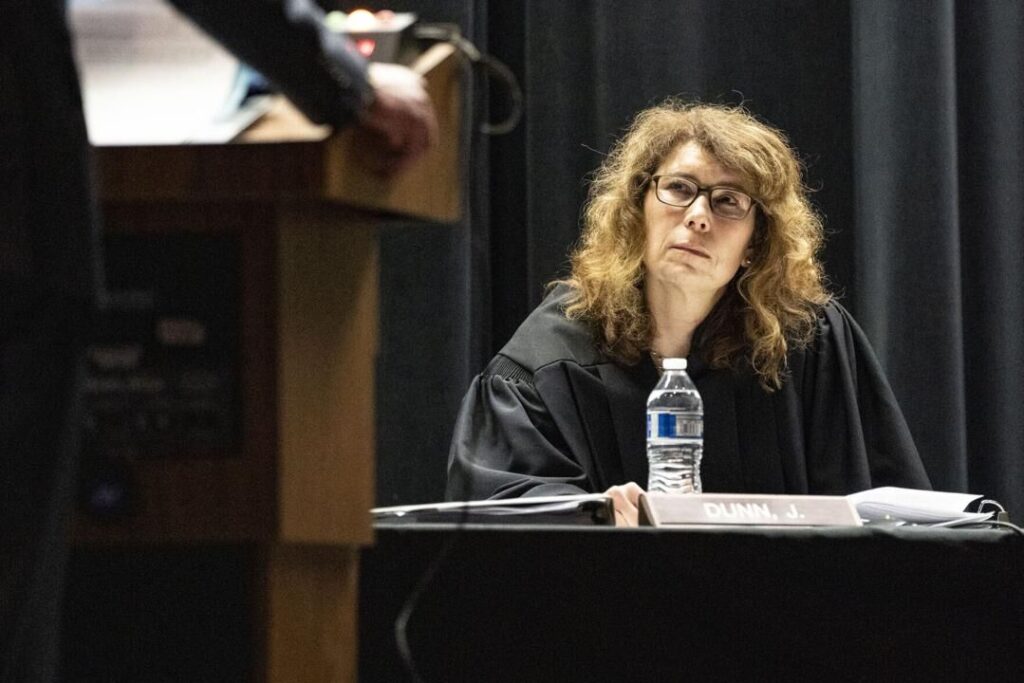Colorado Springs to face trial over adequacy of police training, federal judge rules
The city of Colorado Springs will stand trial alongside four of its officers, a federal judge ruled on Thursday, so a jury can determine if a man’s constitutional rights were violated when police chased him inside his home without a warrant and restrained him as he lay on the floor dying.
Previously, U.S. District Court Senior Judge William J. Martínez concluded a civil trial was necessary to decide whether the officers who interacted with Chad Alexander Burnett immediately prior to his death were liable for unlawful entry, excessive force and failure to provide adequate medical care. Now, Martínez has decided a jury could reasonably find the city’s actions were also behind the alleged constitutional violations.
In a Jan. 23 order, he wrote that jurors will need to hear evidence about whether Colorado Springs adequately trained its officers on how to respond to people in mental health crises, when they need to obtain an arrest warrant, the proper use of tasers, the dangers of face-down restraints and when to summon medical assistance for an unresponsive person.
“In this way, the jury could find that the City’s policymakers acted with deliberate indifference by failing to train officers on monitoring detainees and providing them with appropriate emergency medical assistance when they become unresponsive after a struggle with police,” Martínez wrote.

A Colorado Springs police cruiser at a crime scene.
Burnett’s surviving aunt, representing his estate, sued both the city and the individual officers for allegedly violating her nephew’s rights — by using “tricks,” in one officer’s words — during his mental health crisis.
On the morning of May 24, 2020, Burnett’s neighbors called 911 to report Burnett had threatened someone with a knife. Responding officers learned Burnett’s behavior was an “ongoing situation” in his neighborhood near The Broadmoor resort.
Sgt. Michael Inazu and Officer Matthew Fleming attempted to coax or order Burnett to exit his home. Burnett refused, instead claiming he was a priest, a member of the Dutch army and a member of the band Van Halen.
Eventually, Inazu told Fleming and Officer Joseph Daigle that “we’ve got a million different ways we can go with this” and “I think he’s coming with us.” If the officers found probable cause to charge Burnett with felony menacing, “that absolutely changes the game,” Inazu continued.
Before the officers went their separate ways to talk to witnesses, Inazu concluded: “I would love to say we have some kind of hot pursuit. … But I think because of the time we’ve been here, the courts would not look too happily upon that because we’ve kind of established a status quo for our interaction with him. So, I think all said and done, we’re probably going to need to get a warrant to go in there and grab him if he doesn’t fall prey to one of our tricks.”
Ninety minutes after the officers’ arrival, Burnett once again stepped out — now wearing a Toronto Maple Leafs’ sweatshirt and claiming he played for the team. Inazu started talking with Burnett while Fleming, Daigle and Officer Caroline Barth moved closer. Burnett told them to “stop right there,” but all four charged at him.

Colorado Springs police officers chase Chad Burnett into his home on May 24, 2020.
Burnett retreated inside. The officers entered before the door closed and immediately attempted to subdue him. Barth quickly tased Burnett.
“Kill me now,” Burnett said, as Barth tased him two more times.
Burnett continued to struggle and ordered the officers out of his home. Police got him as far as the front doorway before he fell back inside.
“I told you to relax, didn’t I?” yelled one officer.
After struggling for a few more moments, Burnett ceased and lay on the floor. For the next several minutes, officers intermittently observed Burnett seemed to have a pulse. Otherwise, they put a “spit sock” over his head, laughed about their entry into his home and claimed Burnett was “playing possum” while he remained unresponsive.
“We’re sorry this happened, but you have to listen to the police,” Inazu told a motionless Burnett.
Eventually, the officers started to resuscitate him after he stayed motionless. The coroner would subsequently rule his death a homicide. The Fourth Judicial District Attorney’s Office declined to prosecute the officers, citing the “ongoing, unpredictable threat” Burnett allegedly posed.
On Jan. 10, Martínez declined to end the case in the officers’ favor without a trial. He wrote that jurors could deem the officers’ force unreasonable and find they delayed life-saving aid. As for the officers’ claim that they were justified in entering Burnett’s home because they were in “hot pursuit” of a potential felon, Martínez clarified that the chase occurred long after the suspected crime and away from the suspected crime scene.
Colorado Springs filed its own motion to end the case, listing all of the training its officers received, amounting to hundreds of hours. Therefore, the city argued, its own conduct could not be at fault.
Martínez disagreed.
He noted there was conflicting testimony about the officers’ understanding of how to get a time-sensitive warrant and what, exactly, constituted a hot pursuit. Martínez also observed the city’s evidence about taser training did not specifically address when a suspect could be tased without warning, as happened with Burnett.
“The Court remains mindful that just because the City provides some training on the operation of a taser ‘does not (mean) there is no need for more or different training’,” Martínez wrote.
He added that the city would have known adequate training was necessary because it was virtually certain officers would be in situations where they would need to use tasers, pursue suspects or restrain people.
A nine-day jury trial is scheduled to begin in May.
The case is Estate of Burnett v. City of Colorado Springs et al.











